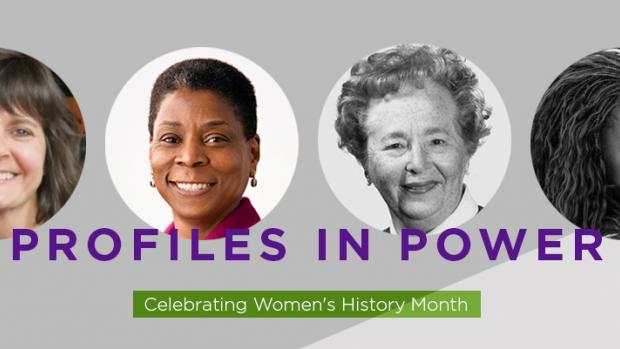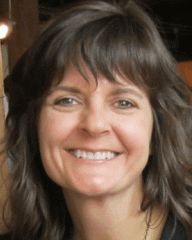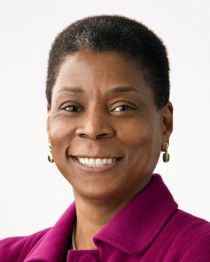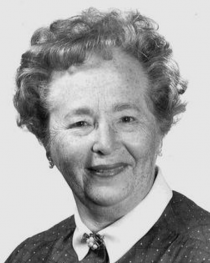Profiles in Power
Celebrating Women's History Month

1704
It may be Women’s History Month, but at NYU Tandon School of Engineering, we believe in celebrating women in STEM all year round. Whether they’re faculty members, students, or alumni, we salute them for forging a strong and welcoming community for all here at Tandon—and for doing their part to advance science, technology, engineering and math for the benefit of the world.
The Student | The Faculty Member | The Alum | The Nobel Laureate
THE STUDENT

Sophomore Cadence Daniels
Cadence Daniels, a sophomore in the Integrated Digital Media (IDM) program, can always count on her mother to encourage her to persevere. “If I’m ever feeling overwhelmed by the number of paths that are open to me,” Daniels says, “my mother tells me that whatever path I ultimately choose, I’m going to get great one day.”
That’s not simply maternal hyperbole: some might assert that Daniels is already well on her way down the path to greatness. An intern at NYU’s Entrepreneurial Institute, an officer of the student chapter of the National Society of Black Engineers, and the co-founder of the group Women of Entrepreneurship (WoE), she has thrown herself into university life, both in Brooklyn and Washington Square, with infectious zeal and real determination.
That probably comes as no surprise to those who’ve known her longest; she is, in many ways, her mother’s daughter.
Daniels’ mother had come to America from her native Kenya in the late 1980s, and while she did not immediately complete her college education, she later returned to school and subsequently worked her way up the corporate ladder at retail giant Target, where she now leads diversity and inclusion initiatives. “We are a family who likes challenges,” Daniels says, “particularly when the odds seem against us.” The male members of the family were similar inspirations; among Daniels’ uncles are a computer programmer and a graphic designer (as well as a U.S. Marine).
“I loved math and was very lucky that my district had a STEM-focused magnet program,” Daniels recalls, “but at the same time, I wasn’t really focused on any one career goal. There were times when I wanted to be a performer or a photojournalist—until my mother astutely pointed out that those were things I could always pursue as avocations rather than professions. No one is ever limited to one role in their community.”
In high school, Daniels took advantage of a distinctive dual-enrollment program offered in Minnesota, where the family was then living. Although she had not yet earned her diploma, during her junior year she took full-time courses at North Hennepin Community College, followed by a senior year spent at the University of Minnesota. It made for a grueling schedule that required long commutes between her high school, where she continued to participate in sports and other extracurricular activities, and the campuses on which she was taking classes, but it resulted in her earning both a high school diploma and college credit concurrently.
Although she initially enrolled at Tandon as a computer engineering major, when she discovered the IDM program, it seemed an even better fit. While still in high school—back in the days before interaction design had become ubiquitous—Daniels had gone on a field trip to a Microsoft facility and marveled when their tour guide demonstrated the technology on a bank of screens lining a corridor. Studying IDM, she reasoned, would be a way to pursue her interests in both computers and design—working on exciting projects like those she had seen on that field trip and, not incidentally, merging the worlds that her uncles had introduced her to years before.
Just a month after a chance visit to NYU’s Leslie eLab, an ideation and prototyping facility for aspiring entrepreneurs, Daniels, then a freshman, found herself interning at the Institute housed there. Impressed by the dizzying array of resources available at both Tandon and on the Square, she and a fellow student soon co-founded WoE—a group aimed at connecting the dots between all those resources and a cross-university cohort of female innovators, makers, and entrepreneurs.
Daniels, who is serving as the creative director of this year’s popular annual NYU Entrepreneurs Festival, says, “That moment when you get an entrepreneurial idea and realize the time is right to go for it—that’s a beautiful thing.”
Helping fellow students bring their own ideas to fruition, ensuring that other aspiring female engineers and engineers of color feel a sense of community . . . those are beautiful things too.
THE FACULTY MEMBER

Associate Dean of Academic Administration and Professor of Technology, Culture and Society Kristen Day
There is perhaps no better example of the changing face of engineering than Associate Dean of Academic Administration and Professor of Technology, Culture and Society Kristen Day.
While it’s acknowledged throughout the Tandon community that we’re very lucky to have her, look at Day’s CV and it’s not readily apparent how exactly she landed at an engineering school. After receiving her bachelor’s degree in psychology from Michigan State University, she went on to earn a doctoral degree in architecture (with a focus on the built environment and how people use it) at the University of Wisconsin-Milwaukee.
Day’s teaching career began in the Department of Planning, Policy, and Design at the University of California, Irvine, and her research focused largely on how to design cities to maximize the well-being of their residents as well as on issues of social and racial justice. (She was the founder and executive director of the university’s Community Outreach Partnership Center, which was funded by the U.S. Dept. of Housing and Urban Development and which addressed pressing issues in the region.)
Day had what she characterizes as a life-changing experience in 2007 when the American Council on Education chose her as a fellow. Assigned to work closely with the president of California State Polytechnic University, she learned budgeting, fund-raising and other integral aspects of administering an institution of higher learning.
Seeking an opportunity to increase her involvement in higher education administration, Day ultimately ended up at another “Poly,” arriving in Brooklyn just as the merger with NYU was being implemented and the role of the Department of Technology, Culture and Society was being reimagined. It was a set of circumstances seemingly tailor-made for her.
Engineers, she knew, would need a broad range of knowledge in such disparate fields as psychology, history, and ethics to flourish in the collaborative, multidisciplinary workplaces of the future, and—as both a faculty member and administrator—she set out to help ensure that Tandon produced well-rounded, thoughtful graduates.
Day had benefited from the guidance of her Ph.D. advisor, Sherry Ahrentzen, a noted expert on housing and community design who worked hard to create an empowering and welcoming milieu for her women students. Now, Day is working with colleagues from across Tandon to make sure aspiring women engineers have everything they need to succeed. (See Box.)
“Students who were not around during feminism’s early days may not call themselves feminists,” she says. “But what they call themselves is not the key issue. As long as they have a good sense of their own capabilities, strength, and power, they will do great.”
Initiatives that support women at Tandon throughout the year
- Woman to Woman newsletter
News and items of interest to women in our community (view archives) - Women in Engineering web page
Profiles of women faculty members, upcoming events, and more (visit Women in Engineering) - Women’s Faculty Luncheon
Each semester, women faculty meet for lunch and enlightened discussion - Women in STEM explorations floor
A new dedicated area in the Othmer Residence Hall - Women’s Summit
An annual gathering with dynamic programming and high-profile guests (visit 2016 Women in STEM Summit)
THE ALUM

Alum Ursula Burns
When she was offered a scholarship to what was then known as the Polytechnic Institute of New York, Ursula Burns (’80) found herself at what she has characterized as a crossroads. “It would have been so simple to let go of my dreams and set out on a more predictable journey,” she said. “It wasn’t easy. I had a lot of catch-up courses to master. I was an oddity in a sea of predominantly white males. I doubted myself big time. I started out in chemical engineering, which I hated, and switched to mechanical engineering, which I loved. And, ever so slowly, I regained my footing.”
Burns was raised in a gritty public-housing project on the Lower East Side of Manhattan, where her mother, Olga, took in ironing and ran a home daycare business to provide for her and her two brothers. Despite the financial hardship the tuition posed, Olga sent her daughter to a Catholic girls’ school. “We were poor, for sure, but we didn't know it,” Burns told one interviewer. “We just didn't have a clue how much trouble my mom was having raising us three, which I thought was the miracle of this amazing woman.”
At her high school library, Burns researched the top-paying jobs for people with math and science talent and set her sights on engineering. Despite her initial self-doubt, she thrived in college. “Polytechnic was academically tough but nurturing,” she has said. “Classes were small and taught by professors who were always there to help. It was the ideal environment for me.”
During her senior year, Burns accepted an internship at industry giant Xerox, where she has remained throughout her career. When she was named CEO in 2009, she became the first woman of color to head a Fortune 500 company. In that role, she spearheaded the largest acquisition in Xerox history (the $6.4 billion purchase of Affiliated Computer Services) and has numerous other accomplishments on her CV.
She credits her alma mater with much of her success. “Everything started for me at this little school in Brooklyn,” she explained, upon receiving an honorary doctoral degree in 2005. “Everyone here made sure we thought only great things about where we went to school and who we were. . . . Poly changed my life.”
THE NOBEL LAUREATE

Nobel Laureate Gertrude Elion
Gertrude Elion, who was born in 1918, faced roadblocks that today’s female students might not even be able to imagine. After she earned a bachelor’s degree in chemistry at the age of 19 from New York City’s Hunter College, she had difficulty finding a job because so many laboratories refused to hire women—even those who, like Elion, had graduated summa cum laude.
After she finally found a lab job that paid what she characterized as “the magnificent sum of $20 a week,” she scrimped for years until she was able to embark on doctoral studies at what was then called the Polytechnic Institute of Brooklyn. Still working full-time, she commuted two nights a week to take classes—traveling more than an hour each way. When school officials decreed that she would need to pursue her studies on a more conventional schedule, Elion made the fateful choice to drop out and continue working. She had by then been hired by the large pharmaceutical company Burroughs-Wellcome and feared that it would not be easy to find similarly gratifying employment again.
At Burroughs-Wellcome, Elion collaborated to develop drugs to fight leukemia, herpes, and AIDS, among other conditions. She and her longtime mentor and collaborator, George H. Hitchens, were awarded the Nobel Prize in Medicine in 1988. Elion, who also received the National Medal of Science and the Lemelson-MIT Lifetime Achievement Award over the course of her career, always graciously and proudly considered herself an alum despite never having completed her doctoral studies.
Awarded an honorary Ph.D. in 1989, Elion reminisced about the distinguished professors she had studied under while at the School of Engineering. “One of my teachers was Dr. Herman Mark,” she recalled, referring to the chemist widely considered the father of polymer science. “[I heard him lecture] a couple of years ago, and he actually remembered me. I couldn’t believe it!”

